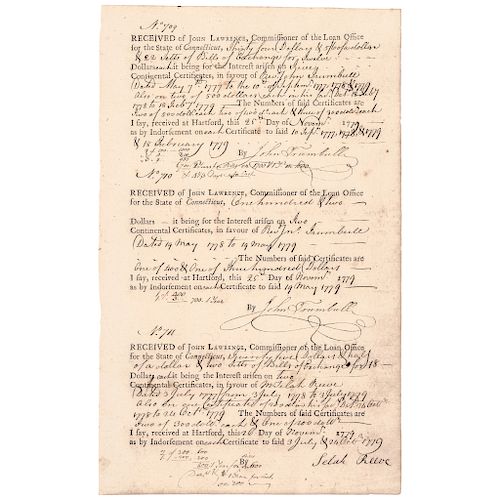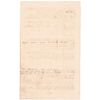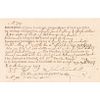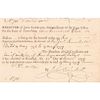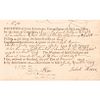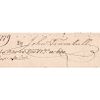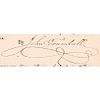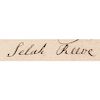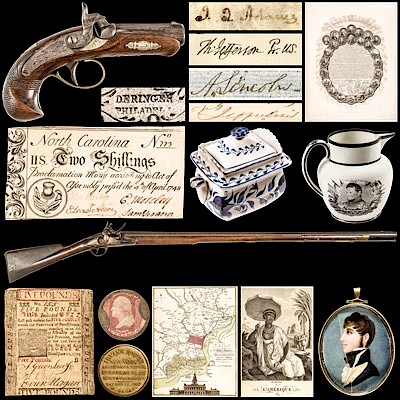REVEREND JOHN TRUMBULL (1715-1787) CT. Vouchers On Continental Loan Certificates
Lot 114
Categories
Estimate:
$600 - $800
Absentee vs Live bid
Two ways to bid:
- Leave a max absentee bid and the platform will bid on your behalf up to your maximum bid during the live auction.
- Bid live during the auction and your bids will be submitted real-time to the auctioneer.
Bid Increments
| Price | Bid Increment |
|---|---|
| $0 | $10 |
| $200 | $20 |
| $300 | $25 |
| $500 | $50 |
| $1,000 | $100 |
| $2,000 | $200 |
| $3,000 | $250 |
| $5,000 | $500 |
| $10,000 | $1,000 |
| $20,000 | $2,000 |
| $30,000 | $2,500 |
| $50,000 | $5,000 |
| $100,000 | $10,000 |
| $200,000 | $20,000 |
| $300,000 | $25,000 |
| $500,000 | $50,000 |
About Auction
By Early American History Auctions
Oct 19, 2019
Set Reminder
2019-10-19 12:00:00
2019-10-19 12:00:00
America/New_York
Bidsquare
Bidsquare : Historic Autographs-Currency-Political-Americana-Militaria-Guns
https://www.bidsquare.com/auctions/early-american-history-auctions/historic-autographs-currency-political-americana-militaria-guns-4513
326 Lots of Rare, Historic Autographs, Americana, Civil War Era, George Washington, Abraham Lincoln, Black History, Revolutionary War Era, Colonial America, Federal Period, War of 1812, Colonial Currency, Indian Peace Medals & more... Early American History Auctions auctions@earlyamerican.com
326 Lots of Rare, Historic Autographs, Americana, Civil War Era, George Washington, Abraham Lincoln, Black History, Revolutionary War Era, Colonial America, Federal Period, War of 1812, Colonial Currency, Indian Peace Medals & more... Early American History Auctions auctions@earlyamerican.com
- Lot Description
Autographs
Governor "John Trumbull" Treasury Payment Signed for Reverend "John Trumbull" Both Connecticut "Trumbulls"
REVEREND JOHN TRUMBULL (1715-1787). Graduated from Yale College in 1735 and became Pastor of the Westbury (now Watertown) Congregational Church in 1739. His nephew was Connecticut's Governor Jonathan Trumbull, the only Colonial governor to support the War for Independence AND Gov. Trumbull's son was the artist John Trumbull.
November 25, 1779-Dated Revolutionary War, Twice Signed, Uncut Sheet of Three, Partly-Printed Connecticut Interest Paid Pay Vouchers for Continental Loan Certificates of money due by the State (2) made to and Signed, "John Trumbull," made to and by Reverend John Trumbull, 1 page, measuring about 8" x 12.25", Choice Crisp Mint. A third similar attached certificate at bottom is Signed, "Selah Reeve." Payments on Bills of Exchange interest in substantial amounts of money for the era. This full uncut sheet is completely original, exceedingly crisp, fresh and clean. It is well printed in black with rich deep brown manuscript portions. Both signatures "John Trumbull" are huge, measuring an average of 4" long. A very scarce fiscal document on Connecticut so fresh that much original press text embossing is retained within its period laid paper. Reverend John Trumbull also was known to have owned Slaves. A great looking Document for display.
Reverend John Trumbull (1715-1787) graduated from Yale College in 1735 and became pastor of the Westbury (now Watertown) Congregational church in 1739. Trumbull was known for his generosity and charm, as well as for his sense of humor.
His nephew was Connecticut's Governor Jonathan Trumbull, the only Colonial governor to support the War for Independence. Gov. Trumbull's son was the historic American artist John Trumbull, whose paintings of the Revolutionary War, including the signing of the Declaration of Independence, are on view in the Rotunda of the United States Capitol building.
Rev. John Trumbull married Sarah Whitman, the daughter of a Farmington minister, in 1744. They had three children who survived childhood: Sarah, who married a Hartford doctor; John, who became a renowned poet and lawyer and served in the state legislature; and Lucy, who married a minister in Danbury.
Rev. Trumbull and his wife taught their son John Latin and prepared him for the Yale entrance examinations when he was still a young child; he passed the entrance exams to Yale when he was only 7 years old, but waited to enter college until he was a teenager. John Trumbull published his first major poem when he was 22, and he passed the bar exam when he was 23.
He worked briefly in the Boston law office of future president John Adams. Trumbull was the lawyer for Waterbury's Thomas Hickcox, Jr. when Enslaved African American and Revolutionary War soldier Joseph Munn petitioned for his freedom from Hickcox.
Rev. Trumbull's will mentions One Woman and Three Girls Enslaved by his family: Lemmon was left to his widow; Mabel to his son John, then living in Hartford and serving in the state legislature; Peg was to remain with his daughter in Hartford; and Cate was to remain with his daughter in Danbury. Shortly after Trumbull's death, his widow moved to Hartford to live with her daughter.
Rev. Trumbull had several other people enslaved in his household, including a girl named Hagar, who died in 1759, and a man named Grigg, who was a soldier in the Revolutionary War and died in 1779.
Rev. Trumbull's cousin, Rev. Benjamin Trumbull, was minister of the North Haven church and delivered a Discourse to the Freemen of New Haven in 1773; the discourse was published and a copy was owned by Waterbury resident Dan Cambridge, a Free African American.
- Shipping Info
-
Early American provides in-house worldwide shipping. Please contact us directly if you have questions about your specific shipping requirements.
-
- Buyer's Premium



 EUR
EUR CAD
CAD AUD
AUD GBP
GBP MXN
MXN HKD
HKD CNY
CNY MYR
MYR SEK
SEK SGD
SGD CHF
CHF THB
THB